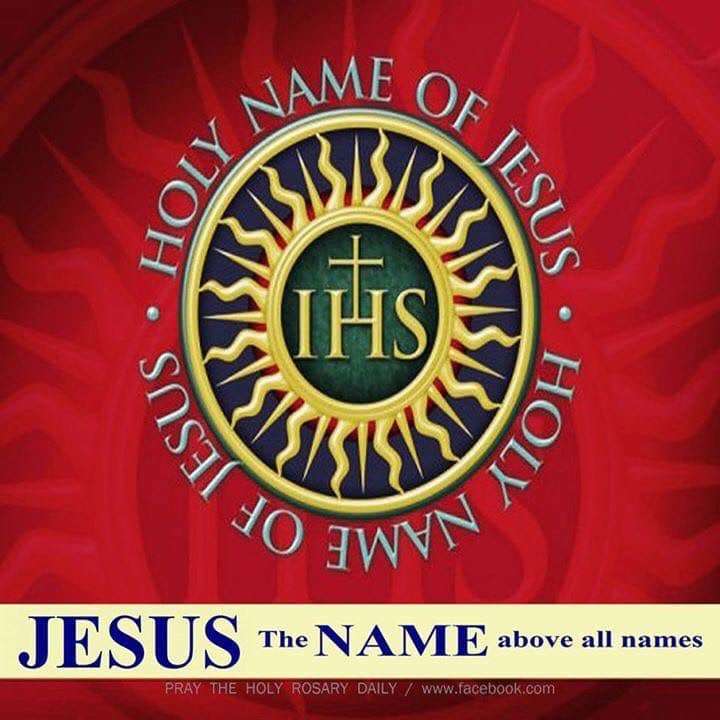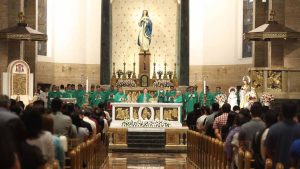152 total views

Memorial of the Feast of the Holy Name of Jesus, 03 Jan 2025, Lk 2:21-24
What is the big deal about the Holy Name of Jesus? Well, it originates from the Hebrew Yehoshua or Yeshua, which means “The Lord saves.” To understand why this statement is a big deal, we have to complete it. The Lord saves whom? The Lord saves SINNERS! And why is that a big deal? Well, because the common presupposition is that the Lord cannot do that. He can only save the righteous and deserving; he has no choice but to condemn the wicked and undeserving into the fires of hell. This doctrine is often called RETRIBUTION. It is actually presupposed by most religions in this world. It is founded on the belief in the conditionality of salvation: only the good ones will go to heaven. All the bad ones will go to hell. Period.
Is that not the same doctrine that is taught by Christianity, you might ask? And the answer is NO. Christianity does not believe in a God who will save only the righteous and law-abiding ones and will burn all sinners in hell. We do not believe in such a powerless God. We believe rather in a God who is both just and merciful, and whose mercy is always greater than his justice. This is precisely the reason why we call Christianity a GOOD NEWS! The radical questioning of this naive and almost automatic notion of RETRIBUTION, OF salvation for the good and damnation for the wicked is what precisely constitutes the radical and revolutionary character of the Christian faith.
In the first place, Christianity does not classify human beings into good ones and evil ones, even if it presupposes that all of us human beings are capable of both good and evil actions. We presuppose, rather, that all human beings are by nature, good. We distinguish between our innate goodness as persons, and our capacity for evil in terms of action, on account of our free will. We all are in a constant battle between good and evil. No amount of evil that we are capable of committing can ever erase the innate goodness of our humanity, as designed by God.
The only warfare that we believe humans must learn to fight are therefore not battles against fellow human beings or against each other, not battles among nations, but a struggle against the evil one who has the capacity to influence, to deceive and manipulate human beings despite our innate goodness. Therefore at baptism, the only thing we are asked to renounce in this world is Satan!
All throughout history, we have always been tempted to give up on ourselves. The manifestations of the human capacity for selfishness and cruelty have often led us to develop such a low self-esteem about ourselves. They have often caused us to surrender to despair and hopelessness about our humanity. We speak about ourselves as “fallen creatures” and we attribute it to our ORIGINAL SIN. How could we have forgotten that before sin came, there was ORIGINAL BLESSING? We have even equated “worldliness” with “ungodliness”, as if this world were so bad. How could we have forgotten that God created this world and “he saw that it was (innately) good.”?
The other name for Jesus in the Gospel is “Immanuel”, a name borrowed from the OT book of the propeht Isaiah, which means, “God is with us.” It is meant precisely to insist that no amount of sin that we are capable of doing will ever make God abandon us. In Jesus, we have found the God who has stubbornly embraced our humanity precisely to transform it into the divine image that it has always been meant to be.
But it was there already in Judaism. Do we not often hear in the Jewish Scriptures about the God who had to endure stubbornness of his people? How they tested and procoked him very often although they had seen all of his works? How God had often threatened to punish them but ended up forgiving them in the end? Christianity sustains the narrative of a God who is merciful and gracious, slow to anger and abounding in mercy. Therefore it has opened the possibility of salvation, not just for the righteous, but for sinners as well, by switching to the vocabulary of REDEMPTION—namely, the option of God to work for the salvation of sinners through his self-emptying act of embracing our humanity precisely to transform it by his passion, death, and resurrection.”He humbled himself, becoming obedient unto death, death on a cross.”
Therefore we call our faith a Gospel, a good news. That while the spiritual battle continues, we hold on to the faith that Christ has already won it for us by paying the price, by offering his own life as a ransom for sinners. That in the end, good will triumph over evil, and that “nothing at all can separate humankind from the love of God.” I hope this reflection makes it clear to you now why God had highly exalted Jesus and bestowed on him what the apostle calls “a name that is above every name.”








